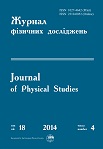Journal of Physical Studies 11(4), 473–480 (2007)
DOI: https://doi.org/10.30970/jps.11.473
THE DEVELOPMENT OF SPHERICALLY SYMMETRICAL
PERTURBATION IN COSMOLOGICAL MODELS WITH DARK ENERGY. AN APPROXIMATION OF THE IDEAL LIQUID
Yu. Kulinich1, B. Novosyadlyj1, V. Pelykh2
1Ivan Franko National University of Lviv, Astronomical
Observatory,
8, Kyryla i Mefodija St., Lviv, UA–79005, Ukraine
2Pidstrygach Institute of Applied Problems of Mechanics and
Mathematics, NASU
|
 |
The development of spherically symmetrical perturbation
was considered within the framework of cosmological models with
dark energy on the basis of ideal liquid approximation. To reach
the generality dark energy is represented as generalized component
governed by state equation $p_{(g)}\equiv p_{(g)}(ρ_{(g)},S)$,
where $S$ is entropy, and barionic component is included into a
dust-like component with the state equation $p_{(d)}=0$. For such
two-component medium the system of equations was built to describe
the development of spherically symmetrical inhomogeneity with an
arbitrary profile of radial density distribution at the non-linear
stage of its evolution. These equations have been thoroughly
analized. It was shown that cosmological models with a generalized
component with state equation $p_{(g)}= -ρ_{Λ}$ at
$ρ_{(g)}^0>ρ_{Λ}$ are equivalent to the $Λ$CDM
models with proper values of parameters. Thus the result from
[Yu. Kulinich, B. Novosyadlyj, J. Phys. Stud. {\bf 7}, 234
(2003); E. L. Lokas, Y. Hoffman, in ıt Proceedings of the 3rd
International Workshop on the Identification of Dark Matter},
edited by N. J. C. Spooner, V. Kudryavtsev (World Scientific,
Singapore, 2001), p. 121] where parameters of collapse were
determined for the $Λ$CDM-models are still valid for a wider class
of models. In the models with non-zero velocity of acoustical
oscillations in the generalized component $c_{s(g)}^2\ne 0$, the
development of central regions depends on the profile, and
consequently on its dimensions. Besides, if $c_{s(g)}^2<0$ then
perturbations of the generalized component appear to be very unstable
to fragmentation which contradicts a small anisotropy of the
cosmic microwave background. If condition $c_{s(g)}^2>0$ is valid
then perturbations of the generalized component with the scale smaller
than $R_g\equiv c_{s(g)}H_0^{-1}$ stop their development due to
dissipation. Therefore the scales of perturbation of the generalized
component appears to be constrained from below by the scale of $R_g$.
PACS number(s): 98.80.Ik, 95.36.+x, 95.35.+d
pdf
